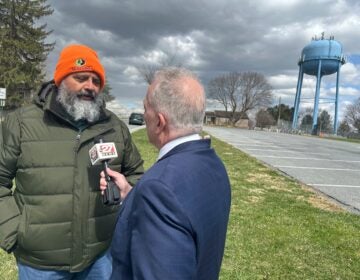Conor Lamb joins Senate race, making a case for the Blue Dog Democrat
Lamb, 37, is a former Marine and federal prosecutor who has spent his short political career carefully straddling party lines.

In this Nov. 6, 2018 file photo, Rep. Conor Lamb, D-Pa, in Pennsylvania's 17th U.S. Congressional District, talks with reporters after voting in Mt. Lebanon. (AP Photo/Gene J. Puskar, File)
After months spent courting donors and potential supporters, Western Pennsylvania congressman Conor Lamb is expected to officially enter the Democratic primary for the commonwealth’s open U.S. Senate seat today at an event at an IBEW union hall in Pittsburgh.
“This is the one that we’ve been waiting for,” said Samuel Chen, a political science professor at Northampton Community College who used to work in GOP politics and now heads political strategy firm the Liddell Group. “I’ve never seen a candidate so quietly hyped up.”
Lamb, 37, is a former Marine and federal prosecutor who has spent his short political career carefully straddling party lines.
He won his U.S. House seat in a 2018 special election, flipping a heavily contested Republican district. He retained the seat just eight months later in the general election, after being drawn into a new district and being forced to run against an incumbent Republican. He was reelected last year.
Lamb will join a Democratic field that includes fellow Allegheny County resident John Fetterman, the current lieutenant governor and former mayor of Braddock, along with Philadelphia State Rep. Malcolm Kenyatta, and Montgomery County Commissioner Val Arkoosh. State Sen. Sharif Street, of Philadelphia, is also exploring a run but has yet to formally jump in.
The question on the minds of Chen and other political scientists now is straightforward: What does it take, right now, for a Democrat to win statewide races in Pennsylvania?
“We’re in a period, a weird time, where both parties are kind of realigning and trying to find their identity,” he said.
There are still certain constants. In Pennsylvania, geography means a lot — especially in Democratic primaries. A disproportionate number of Democratic voters are clustered in the liberal areas in and around Philadelphia and Pittsburgh.
Muhlenberg College pollster and political scientist Chris Borick said those voters tend to be more loyal to the candidates from their neck of the woods: Pittsburgh has Lamb and Fetterman this cycle, and Philly has Kenyatta, Arkoosh, and (maybe) Street.
“We’ve seen this time and time again,” said Borick. “What really is fascinating, and plays into the final equation, is when there’s multiple candidates from an area, how do they divvy that up?”
Numbers, of course, aren’t the beginning and end of a race.
Borick noted that equally important to the outcome of Pennsylvania’s Democratic Senate primary is the fact that the field is, so far, mostly full of avowed progressives. Fetterman is taking a specifically pro-labor angle and has said he believes in “health care as a fundamental, basic human right.” Arkoosh, a physician, has also stressed lowering health care costs. Kenyatta has taken up progressive causes like eliminating student loan debt, and Street has centered gun control.
Lamb, who represents a relatively more conservative district, has taken a different approach. He has balked at big-spending proposals such as a single-payer health care system and tangled with the progressive wing of his party about sweeping messaging on defunding police or banning fracking.
“I’m really fascinated to see how he crafts a message that looks good on all these issues,” said Borick, adding that Lamb will likely try to show “bona fides as a Democrat on labor issues, on environmental issues,” but also present himself as someone who “can win the state and prevent a Trump-aligned Republican from going to the Senate.”
“I think that nuanced message is going to be really interesting.”
There are always certain wedge issues that tend to define the political discourse, and Borick and Chen both said they think energy is a major one.
It has already broken down on regional lines. Kenyatta, for one, has said he supports a moratorium on fracking, but Fetterman and Lamb — whose region of the state has seen the bulk of Pennsylvania energy jobs — have both been outspoken opponents of any sudden stoppage, saying there must be a transition of some kind away from fossil fuels.
Then there is the growing progressive contingent of the Democratic Party. Monica Ruiz-Caraballo, a Pittsburgh-based immigrant advocacy organizer who serves as executive director at Casa San José, counts herself as being in that group. And she said she and many of the Latino voters she works with are looking for a Senate candidate who will be “champions” for them.
“We need people who are going to … create policies and really create change to make not only Pittsburgh, but every part of the state, a place where Latinos and immigrants don’t just survive, but where they can thrive,” she said.
Latinos are a small but growing segment of Pennsylvania’s voting population. Many are more recent immigrants, and so often aren’t yet eligible to vote. But Pittsburgh, Ruiz-Caraballo noted, had a minor influx of Latino voters arrive from Puerto Rico after Hurricane Maria struck.
“A lot of the work that we do is educate [newer immigrants] on how to talk to people who [can] vote,” she said. “So that the issues that are important to them are something that they can communicate with their neighbors and employers, others who do have the power of voting.”
As a voting group, Latinos are diverse — Ruiz noted that, as in many communities, older people tend to be more conservative and less committed to radical change than younger ones. But in general, she sees them as a group that won’t be satisfied with positions that uphold the status quo on issues like immigration, and who will be skeptical of candidates they see as too complacent.
She doesn’t claim to be representative of all Latinos. But she said the candidates in her area, Fetterman and Lamb, haven’t sold her.
“Again, I’d like to see a champion,” she said. “I haven’t seen it in either one of them.”
Fundraising will also play a significant role in the outcome of the campaign. Thus far, Fetterman leads the pack, with more than $3 million in the bank and a robust national fundraising effort. He’s followed by Arkoosh, with more than $600,000, and Kenyatta with under $300,000.
Lamb, Chen said, “can fundraise with the best of them.” His congressional campaign account currently has about $1.8 million on hand.
Chen, who served as a staffer for a long list of GOP politicians — including then-congressman Pat Toomey and former congressman Charlie Dent — and was involved with former Gov. Tom Corbett’s campaign, noted that Pennsylvania remains very purple. But where a few decades ago that might have meant lots of voters are moderate — a dynamic that gave rise to the middle-of-the-road “Blue Dog” Democrats, of whom Sen. Bob Casey is one of the few remaining examples — now it means that voters are polarized and a few remain in the middle.
It’s something Lamb is clearly keenly aware of, Chen noted.
“In his introductory video, as a congressional candidate for the first time in his life … there’s an image of him firing an AR-15,” Chen said. “This is the image that he’s trying to emphasize: talking to Republicans and Democrats, working with both parties.”
It works well for Lamb in his congressional district. It might work in the general election. But first, he has to get through a primary in which a significant number of voters are likely to be skeptical of a moderate white guy with a propensity to show off his pro-gun ideology.
“He has to skew a little bit left,” Chen said. “You begin to see it in some of his fundraising emails — he’s starting to criticize the filibuster. The problem, of course, is if he wins the primary, does he have to come back to the center to win the state? And if he does, he then risks being called a hypocrite.”
That will depend, of course, on who Republicans choose from their equally large, politically wide-ranging field. With both parties still far from consensus on what they stand for or who they’ll rally behind, Chen said for now, it’s anyone’s game.

Get more Pennsylvania stories that matter
WHYY is your source for fact-based, in-depth journalism and information. As a nonprofit organization, we rely on financial support from readers like you. Please give today.









